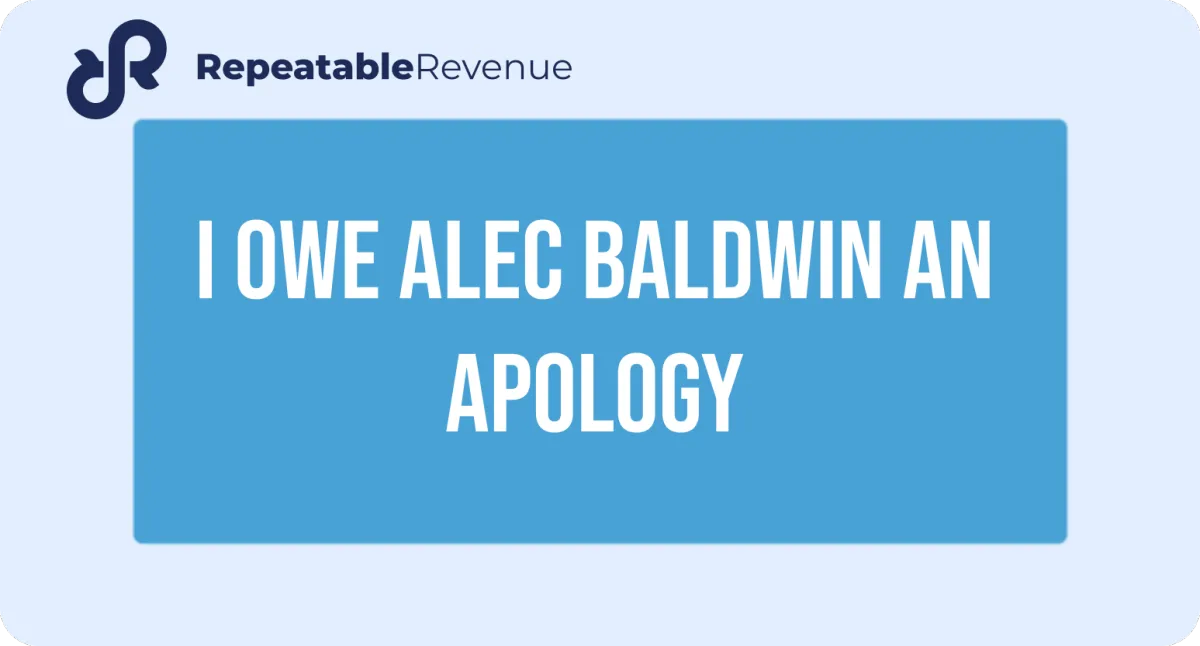
I owe Alec Baldwin an apology

If you think "Always Be Closing" is outdated, “hard sell” advice from the 80s...
You're right. And you're wrong.
Let me explain.
Early in my sales career, ABC stuck with me as a newbie. It was a constant reminder that closing matters.
But as I got more sophisticated with consultative selling, I started believing ABC was completely misguided. Just archaic advice that gave sales a bad name.
I was the guy rolling his eyes at "coffee is for closers."
Then something shifted.
I came full circle with a completely different understanding:
We ARE always closing. Just not how you think.
The Whiteboard Moment That Changed Everything
Picture this: You walk up to a whiteboard. On the left side, you write "OPEN DEAL." On the right side, you write "CLOSED DEAL."
Everything in between? That's your sales process.
Here's what most people get wrong: They think the stuff in the middle is separate from closing.
It's not.
Every single step between open and closed is designed to close the deal.
Your qualification calls? Designed to ensure you CAN close by confirming you're talking to the right person
Your discovery calls? Designed to uncover the pain points you need to close
Your needs assessment? Designed to build leverage for closing
Your proposal presentation? Obviously designed to close
But most salespeople think closing starts at the end.
That's why they struggle.
The Three Mistakes That Kill Consultative Sales
Mistake #1: Discovery Without Direction
Most people run discovery like they're genuinely just trying to learn about the business. And don't get me wrong—you're not being disingenuous.
But look at the difference between these questions:
Basic: "How many employees do you have?"
Closing: "How many hours per week does your team waste on this problem?"
Basic: "What tools are you currently using?"
Closing: "What's broken about your current tools that made you take this meeting?"
Basic: "Can you describe your workflow?"
Closing: "Where does your workflow completely fall apart, and what does that failure cost you?"
Basic: "What are your goals for next year?"
Closing: "What's the one goal you'll miss if nothing changes?"
Basic: "What's your budget range?"
Closing: "What's this problem currently costing you per month in lost revenue or wasted resources?"
Basic: "Walk me through your decision-making process."
Closing: "What happened the last time you tried to fix this, and why didn't it work?"
See the pattern?
Basic questions get you information. Closing questions get you ammunition.
They force prospects to articulate pain, quantify problems, and mentally commit to change. They can't just give you a tour—they have to confront their reality.
You're not just learning. You're building the case.
Mistake #2: Assessment Without Urgency
Whether you're running a technical assessment, business audit, or needs analysis—most people think finding problems is enough.
It's not.
Why? Because prospects don't automatically connect problems to business impact.
Here's what most people do:
"Your security has vulnerabilities"
"Your processes are inefficient"
"Your systems don't integrate"
You know why these matter. But your prospect might not.
Here's what closers do:
"Your security vulnerabilities mean one breach could cost you $X and Y days of downtime"
"Your inefficient processes are burning 20 hours per week—that's $Z per month in wasted payroll"
"Your systems not talking means decisions based on bad data—what's one wrong decision cost you?"
Don't just find problems. Connect them to dollars, time, and risk.
The assessment should make NOT buying from you feel dangerous.
Mistake #3: The Proposal Performance
This is the biggest mistake of all.
Most people create a proposal, build a great presentation, and think their job is to deliver it well, smile at the end, and let the customer decide.
That's not a proposal. That's a book report.
The purpose of your proposal isn't to inform. It's to close.
The proposal in a consultative sales process should:
Highlight the gap between where they are and where they want to be
Show exactly how you close that gap
Make it crystal clear why you're different
Include concrete next steps with dates
Create natural urgency (not fake scarcity)
Set you up to ask for the sale RIGHT THERE
If your proposal ends with “I’ll let you look it over” or "Let us know what you think," you're doing it wrong.
The Real ABC Framework
Here's the reframe that changed everything for me:
Always Be Closing doesn't mean pushing for the sale in every conversation.
It means recognizing that every conversation, every touchpoint, every interaction is strategically designed to move toward a closed deal.
When you understand this, two things become crystal clear:
Every step has a purpose (and that purpose is closing)
You're not being pushy, you're being strategic
This isn't about pressure. It's about intelligent design.
Your job as a sales strategist—whether you're a founder, sales leader, or individual contributor—is to engineer the optimal sequence of steps that naturally move an open deal to a closed deal.
Your Next Move
Grab that whiteboard.
Draw your sales process from OPEN to CLOSED.
For each step, ask: "How does this step specifically help close the deal?"
If you can't answer that question clearly, that step needs work.
Because at the end of the day, you really are always closing.
You just need to be smart about how you do it.
Until next week,
Ray
PS - if you’re an MSP and want an audit of your process, we have a couple spots open for a sales process audit in October. We go through your process end-to-end, document it, highlight the gaps, and give you the plan to fix them. Just hit reply and let me know if it’s something that would help.
